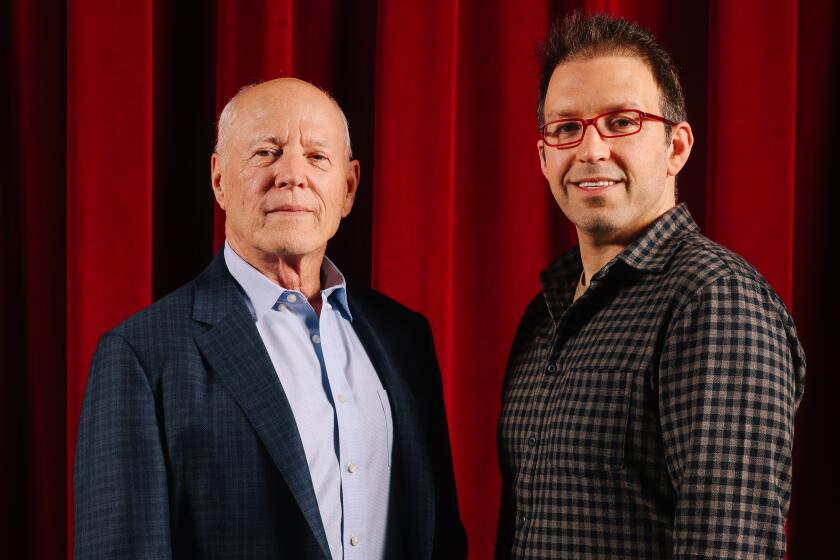Motion Picture Assn. of America faces a difficult scene
When the late Jack Valenti held court, with his silver mane, White House contacts and celebrity friends, the Motion Picture Assn. of America boasted the Washington lobbying establishment’s equivalent of the double feature: political clout playing alongside Hollywood glitz.
Politicians and other power brokers snapped up invitations to private screenings of new movies in the MPAA’s 70-seat theater just two blocks from the White House. Members of Congress and foreign dignitaries sipped champagne and mingled with movie stars -- and later might listen attentively when Valenti lobbied on industry issues.
Those heady days seem to be giving way to a less glamorous and less expansive future.
Like a director who has just been told that his ambitious movie project must be scaled back, the Hollywood trade association recently took a big hit when its member studios cut as much as 20%, or about $20 million, from its budget, leading to staff layoffs in Los Angeles and Washington.
The cuts come just when the association needs money to cope with myriad problems spawned by digital and other technological changes, including virulent piracy of the studios’ most valuable products: movies and TV shows.
As if to reinforce the point, in recent weeks the Internet has been crackling with a pirated copy of the big summer film, “X-Men Origins: Wolverine,” a leak so troubling that the FBI launched an investigation.
The pirating of “Wolverine” may not ultimately hurt it at the box office, if early surveys of enthusiastic audiences are indicative of how the film will perform.
Nonetheless, the companies behind Hollywood’s lobbying activities today encompass a lot more than just the movie business.
The organization’s members -- 20th Century Fox, Walt Disney Studios, Paramount Pictures, Sony, Universal Studios and Warner Bros. -- are owned by multimedia giants whose interests go beyond the parochial views of Hollywood. Although it was once a relatively simple task to get all the studios on the same page, today the MPAA finds itself sometimes having to negotiate compromises among the competing agendas of its members’ parent companies. Most of the companies now employ their own high-paid in-house lobbyists, who need to worry about the interests of only one company rather than six.
“Jack Valenti could know in a couple of phone calls what the position of the studio bosses was,” said Marty Kaplan, director of the Norman Lear Center at USC’s Annenberg School for Communication. “Or he could just call Lew Wasserman and everyone would fall into line,” Kaplan said, referring to the legendary former head of Universal Studios’ onetime parent company, MCA.
Valenti, who died in 2007 after leading the MPAA for 38 years, developed a network of important political contacts while serving in the White House under President Lyndon B. Johnson. With candy stripe shirts and the perpetual Malibu tan of a Hollywood actor, Valenti dished out quotes and maxims like John D. Rockefeller dispensed dimes to Depression-era kids.
When Valenti retired, the studios went outside -- way outside -- Hollywood to find a new chief lobbyist . They picked Dan Glickman, a former nine-term congressman from Kansas and secretary of Agriculture under President Clinton. Although a seasoned Washington insider, Glickman, with his Midwestern background, struck many as an unusual choice.
But even Valenti might have found it difficult to navigate the economic pressures facing Hollywood today.
“The studios are telling us they want a leaner and meaner organization, and that we need to focus on our prime priorities,” Glickman said in an interview. “All the studios have been laying off people, so it’s pretty hard for us to remain immune from those cuts.” He said the cutbacks did not mean MPAA’s lobbying role had been reduced.
Jim Gianopulos, co-chairman of News Corp.’s Fox Filmed Entertainment unit, agreed, saying the budget cuts stemmed from the bad global economy, not a retrenchment in support by the studios to the MPAA’s mission.
Still, Glickman himself is fighting the perception among many in Washington that his time as Hollywood’s lobbyist is running out. He recently received an 18-month extension on his contract, according to people close to the negotiations, considerably shorter than the term a lobbyist who is expected to be in for the long haul would receive.
Some studio executives have been dismayed with Glickman’s more detached managerial style, unlike Valenti, who was immersed in, and consumed by, the business as well as the culture of Hollywood.
One person close to the situation, however, said that conflicting agendas of the media giants had undercut Glickman’s ability to forge unitary stands.
“Their members are virulently, aggressively fighting each other,” the person said. “Coming to consensus is really challenging. That forces you to take a position of neutrality on issues that are important.”
Of some solace is that the movie business, at least in terms of ticket sales, is thriving. Since January the industry has reaped more than $2.9 billion at the box office, a 17% increase from the previous year, a statistic that several senators cited in their decision to cut $246 million in entertainment industry tax breaks from the economic stimulus bill enacted this year.
“The theaters are doing well, but below the surface, on the broadcast side, the theme park side, they are getting killed,” said Rep. Adam B. Schiff (D-Burbank), who has been active on copyright issues.
Acknowledging a bias in Washington from some quarters because of Hollywood’s “perceived political leanings,” Schiff said that “those who are looking to attack the industry will always find a reason.”
More telling of Hollywood’s economic health, however, are DVD sales, which have long propped up the movie business. DVD sales were down 9% last year, and many expect them to decline even further this year as consumers try to rein in spending.
“There’s an appearance of Hollywood doing just fine,” Glickman said. “The cinema business has been better than probably others; the escape of going to the movies is cheaper than a psychiatrist and probably less threatening. But we’ve lost a lot of people in our industry, and ultimately we will rise and fall based on the general economy.”
Although the MPAA lost the battle for stimulus dollars this year, the organization had more success at the end of 2008, when Congress renewed industry incentives that were set to expire as part of President Bush’s $700-billion bank bailout.
The association also cites traction on the piracy front, including millions of dollars in fines levied last year against Internet search engines that help users download pirated movies.
Yet some question the viability of the MPAA’s “litigation model” as the best way to stop piracy, positing that trying to endlessly stamp out illegal downloading and copying via lawsuits is futile.
Fred von Lohmann, senior staff attorney at the Electronic Frontier Foundation, a San Francisco-based consumer advocacy group that defends digital rights, said that although the MPAA was “batting an impressive average,” the industry was “absolutely losing the war.”
Von Lohmann, who represented the person-to-person file-sharing company Grokster Ltd. in its Supreme Court loss to Metro-Goldwyn-Mayer Studios Inc. in 2005, said the studios had two choices: Circle the wagons and protect their existing distribution network, or take the “Hulu approach,” referring to the free and increasingly popular online video service launched last year by NBC and Fox.
The Hulu approach, Von Lohmann believes, is the only viable option to combat piracy.
Calling it a “constantly evolving situation,” Glickman said that members make their own decisions on the business side for combating piracy. The MPAA’s role, he said, is to reduce the governmental impediments that would block those efforts.
USC’s Kaplan believes the Valenti technique of courting Washington power brokers by inviting them to view movies before the public is still a powerful tool.
“I think as long as they can keep their Washington screening room, they’re fine,” Kaplan said. “MPAA remains a hot ticket in that town, as long as they can keep showing sneak previews to a lot of their friends.”
--
More to Read
The biggest entertainment stories
Get our big stories about Hollywood, film, television, music, arts, culture and more right in your inbox as soon as they publish.
You may occasionally receive promotional content from the Los Angeles Times.





